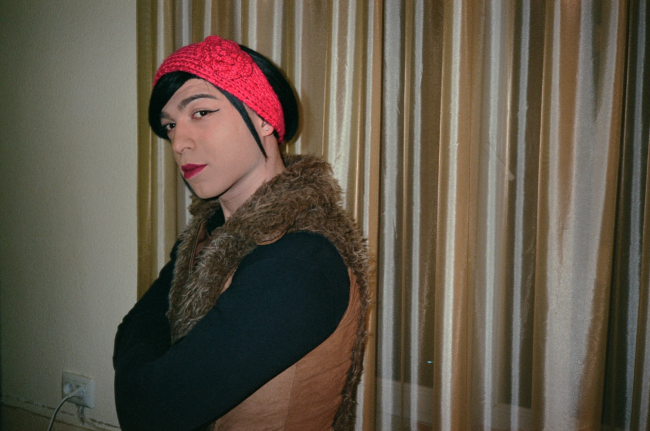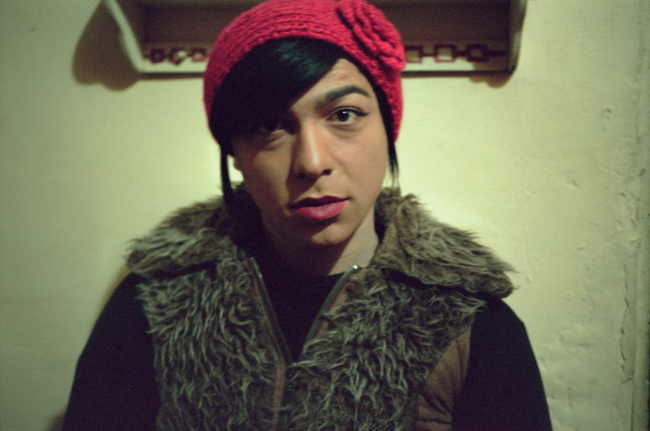
‘He sold his soul’ — the North Caucasians going to war to make a living
Poverty and low wages make enlistment in Russia’s war in Ukraine a tempting offer for many in the North Caucasus.


 Transgender woman, activist, and sex worker, ‘Nata’, shares stories of living in a society where homo- and transphobia is deeply entrenched, with the threat of violence and murder constantly looming.
Transgender woman, activist, and sex worker, ‘Nata’, shares stories of living in a society where homo- and transphobia is deeply entrenched, with the threat of violence and murder constantly looming.
OC Media: Tell me about your background growing up a transgender woman, and how you came to Tbilisi.
Nata: I’m from a small village in Kakheti. In the village I didn’t know what transgender meant. I believed that I had a past life where I was a Turkish woman interested in botany. I used to be a woman who has been reincarnated in this body that I have now.
When I first met transgender women it was by chance in a marketplace in Tbilisi. They explained to me what the phenomenon was and taught me everything. I was 15 when I first went to the area around the circus. They told me that this is where they gather, and that they’re involved in commercial sex work.
At 15 I went to the circus to meet people. I didn’t start working yet. I would dress as a man and work at a petrol station, but they kicked me out for having eyeliner on my eyes and said I was too feminine. When they kicked me out, I met another transgender woman who said that we can live together and work together next to the circus. I was 16 at this time. I didn’t start immediately.
I decided to apply for a course at a culinary academy. I was working as a cook in the Ministry of Defence, but I would still stand in front of the circus sometimes, even though I had enough money to support myself. I didn’t want other transgender people to think that now that I had a job I wouldn’t be in touch with them. I liked that I was appreciated and loved by this community.
OC Media: What is the history of the sex trade outside the circus?
Nata: In Shevardnadze’s time, sex workers were only heterosexual women. And then gay men started to come around and rent houses and motels to them for hours at a time, and that’s how they also got to meet clients for themselves. Many would identify themselves just as gay men, but I know some people who are around 60 and realise now; ‘oh that’s what I am’. They didn’t have any information so they would say they were gay men, but actually they were transgender women. For the past 6 or 7 years, only transgender women are standing there. Sometimes I don’t go for two months, sometimes every day. I have some people under my wing. If a newcomer goes there and says that they’re with Nata, it’s a type of protection. We have a self-coordinated respect system.
OC Media: Can you describe the type of customers that come? Are they repressed homosexuals; people who are openly queer; married men?
Nata: You cannot generalise the category of customers. Once I had several men in one day and they were all different. Sometimes they are men who identify as straight but it’s a cover — they have a wife and kids to avoid questions. Sometimes they are people who have fetishes. Sometimes they don’t even want sex; they just want to hang around, wear a dress around me, drink a coffee with me, wear heels… the hidden things that they usually wouldn’t do with their own partners. There are regular customers, which is lucky, because once they’ve been with you they trust you and have your number and don’t go to others.
OC Media: How do you protect yourself from violent and abusive clients, and from people on the street?
Nata: Usually we’re attacked every night. Sometimes by groups. Sometimes by individuals. It’s very frequent. So we have areas where we hide.
I’ve had several cases where customers have tried to attack me, but usually I wouldn’t take them home until I’m sure that it’s safe to. I always carry a knife. Once, one of my regulars choked me, so I stabbed him in the legs. At that time I still wouldn’t call police because I was young and afraid. And he could not call the police either because I had several bruises on my body and face.
I had another case where I went with someone to Tskneti. We had been together before. After our sexual encounter he suddenly pulled a gun on me. I had pepper spray; I sprayed him and beat him and threw the gun away, and I had to walk back to Tbilisi from Tskneti. Most of the time I don’t report this to the police because it’s ineffective, and because I have to stay all night at the station and still nothing happens. Mostly the police don’t really do anything about transgender people. They come, they talk to us, they are very friendly, but once something happens and we need their help, they’re not supportive.
OC Media: Do you think things are improving, getting worse, or staying the same for the transgender community here?
Nata: Things improved during the [government of the former ruling] National Movement, because when the police came, they would do their job. They would arrest the perpetrator, you would report it and have some outcome. But now, they usually come and make fun of us. It’s getting worse. Things should be improving as we have this anti-discrimination law now, but this is not the case. Many people are getting used to the idea of transgender people existing, but the ones that want to attack us have this mentality that ‘I’m not going to get punished’, and most of the time they’re not.
OC Media: Why do you think this is? Are people becoming more conservative or transphobic?
Nata: Of course I blame the homophobic and transphobic prejudices that exist in this country, but it’s not only coming from the outside. The transgender community often behaves badly, and are also provocative. They’ve been victims so many times that they want to make someone else a victim, so that’s a process and chain of violence that’s hard to break. Sometimes they attack customers who are driving there in their car, even though these customers are arriving peacefully. There’s a group of transgender people making the stigma much worse. Of course I blame society, but I also blame a certain group of transgender people. They are used to constantly protecting themselves.
I was once living in Samgori, in one Italian yard with 11 families living there, and when I arrived there they hated that a transgender person was moving in next to them. And now I visit them like family. The way you present yourself is the way you get treated in return.

OC Media: Can you tell me about medications and hormone programmes? How people get them into Georgia.
Nata: I was thinking of getting hormones when I was younger, but I have diabetes and my health wasn’t good enough. I lost my hair. I’m a very healthy person now. I don’t take drugs; I don’t smoke; I don’t drink. I cannot look the way I want to look all the time, but right now I’m ok with that.
There are some transgender people receiving hormone treatment. Some of them find it on the internet and try to get it posted. The treatment is self-directed — they do it by themselves. Some people go to special doctors, psychologists, and it’s all structured. But it’s not so common. Mostly transgender people will just get breast operations. But personally I just want to have hair on my head.
There were doctors that would give you a paper that says you are really transgender and you’re not making it up. In order to get this certificate you have to attend several sessions. A sexologist and a psychologist would observe you, but in Georgia we don’t have many friendly sexologists or psychologists so they would make the process even longer to make more money from you. Usually it takes between one and two years. I saw the way they treated my friend and I didn’t want to go through that. There are no particular guidelines for the health of transgender people, so it’s not properly regulated by the state.
OC Media: Why are you interested in talking to the public in an open way? Is it because you want to raise awareness, or…
Nata: The problem is that people don’t know about transgender people. People get the wrong — homophobic — information. We are not disgusting. In Georgia, people don’t know much about transgender people, so the more that it is talked about, with more information and personal contact, then people will realise that we are also people.
OC Media: Would you like to stay in Georgia, or would you like to go to a seemingly less transphobic country? Or do you have a duty to the community here?
Nata: I am not a patriot but I want to stay here. I lived in Turkey and it was good, no one had a problem with my gender identity. I was invited to different clubs, different shows. It was more progressive, and the quality of life for transgender people was better. But escape is not really the way to solve a problem. I think that if I want to solve something then I have to stay and fight for it. In Georgia, it doesn’t matter how much of a woman you look like or are, they will still bury you in the clothes of a man. When Sabi Beriani was murdered [and her house subsequently set on fire], they buried her in men’s clothes; as a ‘man’. Society will never be ok with you, but it’s worth the fight. Even though there are all these hate-crimes, violence, and problems, I am still something valuable here, and that’s what’s important.
OC Media: Do you identify as an activist?
Nata: I have been an activist since childhood. When somebody is discriminating against transgender people, even if I’m not dressed as a woman, I will say I am also a transgender woman so don’t say that, don’t test that. I’m also learning about activism. I don’t know how active I am. I don’t know what is, or how to behave, or be, a formal activist. With my choices, my way of life, I’m a real fighter. The way I choose to be open is a form of resistance. It’s a lived activism.
OC Media: Is there any personal message you wish to make?
Nata: I would like to say to the parents who read this that if your child is transgender, lesbian, gay, bisexual — someone that is not in the hetero-normative world — then don’t kick them out. Beating them or isolating them will not solve things. Just talk to them and realise who they are. My family never abandoned me. To this day they are still supporting me in everything, and this is what makes me strong. This is a huge backbone for me. I could study, I could make my own choices. When you are 18 years old and you have to live underground, then it’s more likely that you’ll live a harder life, and one day you could end up murdered, and it will devastate your family. More talking. More tolerance. Take your children as they are.
Interpreter: Tata Beria.